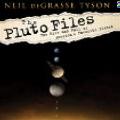If Pluto were discovered today, few astronomers would classify it as a planet. At 2,500 kilometers in diameter, it's smaller than seven moons in the solar system - including our own moon -, and it's the only planet that crosses the orbit of another planet. It is therefore no wonder that some astronomers started reconsidering the question of Pluto's planetary status. "In the 1990s, we in the astrophysics community were discovering icy bodies in the outer solar system orbiting the way Pluto orbits the sun," says astrophysicist Neil deGrasse Tyson, the director of the Rose Center for Earth and Space at the American Museum of Natural History in New York City. "And we found other icy bodies out there and said, 'Well, wait a minute! Maybe Pluto is not just an oddball planet. Maybe Pluto is a normal version of this other class of object - these icy bodies, these icy comets.'" Tyson says the eight other planets form two neat groups: Mercury, Venus, Earth and Mars are all small and dense and rocky, thus forming one "family" of objects; while Jupiter, Saturn, Uranus and Neptune, are all big, bulbous and gaseous, and they all have rings and many moons. Tyson and his colleagues grouped them together as well.
When Tyson and his colleagues designed the exhibits at the Rose Center and focused on the characteristics of the objects in the solar system - not the label "planet" - the count of the planets ceased to matter. "That's not where the science is," explains Tyson. "The science is in the properties of these objects, what they have in common, and how they differ. It's that simple." More difficult was dealing with the surprising emotional attachment people had to Pluto as a planet. Tyson was deluged by letters from the public, including some very irate school children, decrying what they saw as Pluto's unfair demotion in the Rose Center's solar system exhibit. In Tyson's new book, The Pluto Files: The Rise and Fall of America's Favorite Planet , he tries to understand what all the fuss was about. "Had Neptune been demoted, I don't think anyone would have cared," he says. "They may have commented on it briefly, but there would not have been an emotional outpouring. I thought long and hard about this, and I have only one answer. It's the dog!" That would be Mickey Mouse's dog Pluto, the Disney character who was first sketched in 1930. That was, perhaps by coincidence, the same year that Pluto, the cosmic object, was discovered.
"So they each have the same tenure in the hearts and minds of Americans. If you go to Europe [and talk about Pluto's planetary 'demotion'] they say, 'So? Pass the wine!' So I blame Disney all the way!" Tyson says with a half-serious chuckle.
The solar system's Pluto was named at the suggestion of an English school girl, for the Roman god of the underworld. It was considered an apt name for a distant world, cold and dark.
Astronomers earlier in the 20th century had discovered what they thought were irregularities in the orbit of Neptune and suspected that another planet - "Planet X," they called it - was responsible. Clyde Tombaugh, the farm boy and amateur-astronomer-turned-professional who found Pluto, was the only American to discover a planet. That may be another reason why many Americans want to keep Pluto in the planetary club.
Ironically, it turned out that Neptune's orbit was regular after all. The odd measurements were due to a faulty clock at the observatory that reported them. It also turned out that Pluto's orbit is erratic, and that unlike all the other planets, which are made up of rock or gas, it is composed mostly of ice. "So if you bring it close to the sun, even to Earth's distance, heat from the sun would evaporate the ice, and it would grow a tail. We have words for things with tails. That would be 'comet'!" adds Tyson.
In 2006, Tyson and his colleagues were vindicated by a vote of the International Astronomical Union, which defined a planet (as translated into laymen's terms) as a round object orbiting a sun that does not orbit another round object and that has cleared its orbit. Pluto and several other objects in the solar system were reclassified as "dwarf planets." It's a designation that many here on Earth may not appreciate, but which Tyson assures us is probably just fine with Pluto itself. By Adam Phillips New York City 11 February 2009

